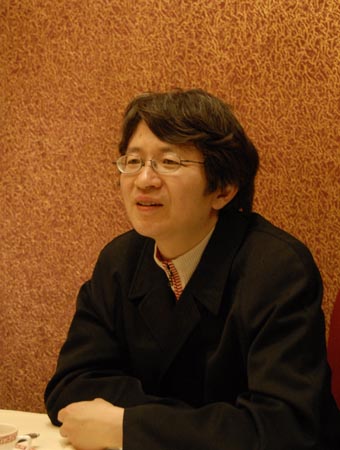|
 |
|
Wang Hongtu (LV LING) |
When you type in Wang Hongtu's name at Baidu Baike, a Chinese-language online encyclopedia, you get the following entry:
"Wang Hongtu, male, born on December 29, 1963 in Shanghai. He is an associate professor in the Department of Chinese Language and Literature at Shanghai-based Fudan University and a graduate supervisor on comparative literature and world literature. He is also a member of the International Comparative Literature Association, commissioner of the Youth Academy Committee of the China Comparative Literature Association, and Director of the Shanghai Comparative Literature Association. He obtained a master's degree in comparative literature from the Department of Chinese Language and Literature at Fudan University in July 1989, and another Master of Arts degree from Indiana University in the United States in October 1996."
After reading it, one can easily grab some ideas about Wang, a Shanghai local with overseas learning experience.
"I'm especially sensitive to cultural exchanges and interactions between China and foreign countries, given that my major was in comparative literature," Wang told Beijing Review.
After graduation, Wang worked at the Shanghai Academy of Social Sciences for five years before going to the United States in 1994. He returned to Shanghai in 1996 and then served at his alma mater Fudan University until he was assigned to Japan's Kyoto University of Foreign Studies as a visiting lecturer in 2004. He then served as vice director of the Confucius Institute, an organ to promote Chinese language and culture, at the University of Hamburg in Germany from November 2007 to November 2009.
Obviously, Wang has experienced more than his online profile suggests. More importantly, his life track in different cities around the world gives him fresh interpretations of Shanghai.
"Cities in China underwent sea changes during my five-year stay abroad," Wang said. "Shanghai, of course, is no exception."
Wang's first-ever overseas trip remains fresh in his memory. In 1991, he attended an international comparative literature conference in Japan. Compared with Japan's capital Tokyo, Shanghai, the largest city in China, seemed like "a shabby town."
But Shanghai regained its charm as an international metropolis while Wang was living overseas.
"The only word that can sum up the city's development in the past two decades is dazzling," he said.
Born and raised in Shanghai, Wang has a strong sense of belonging to the city. This can be seen through his literary works, which are mostly set in noisy and colorful Shanghai.
"His work penetrates various superficial portraits of Shanghai," Zhang Sheng, a Shanghainese writer, said regarding Wang's novel Sweetheart, Who Is Knocking at the Wrong Door? "It's like he is raising a sparkling jewelry window curtain, which helps us open up the door of Shanghai to see what's hiding inside."
Wang once described the metropolis as "charming but horrible" in a tutorial on urban life, adding that the concrete and steel jungle had smashed many people's dreams. Wang believes that the metropolis, in the process of globalization, has functioned as an economic engine, and the trend has been accelerating. Now China has entered a period of rapid urbanization. With the development of this process—more than half the world population now lives in urban areas—the whole world is on track to become a big city.
"I would miss Shanghai more whenever I was on foreign soil," Wang told Beijing Review. "On one hand, the city gives me high awareness of alien cultures, and helps me appreciate the comfort and convenience brought by modern civilization. On the other hand, however, it also pushes me to see the negative side of modern civilization."
Today's Shanghai, in Wang's eyes, integrates all the essential elements of a metropolis domestically and internationally, in parallel with its side effects—people might find their life here anxious and insecure due to the high cost of living, human indifference, the breathless pace of life, and the high value placed on having money.
"Everyone here in Shanghai seems like a businessman," Wang said.
The changes in the city can be felt through the changes in people's emotions. Wang said the so-called "nostalgic mood" shared by Shanghainese was just a cultural phenomenon from the mid-1990s to early 2000s, with writer Chen Danyan's works as a typical example. As Shanghai has experienced economic regeneration and development, such a mood has gradually faded away.
Wang does not agree with the ongoing Shanghai World Expo's theme, "Better City, Better Life," which he thinks is "incomplete."
"As I mentioned previously, one of the side effects of urban life is that a majority of people here are unhappy because they have yet to enjoy a better living environment," he said. "For Shanghai, its structure is being reshaped in the first decade of the 21st century. Shanghai has accumulated various contradictions, making it one of the cities across the country with the widest gap between rich and poor."
Wang is a unique and somewhat harsh critic of Shanghai's culture. He said the power of local cultural originality has been shrinking drastically, making the city a platform or stage for others. But the Shanghai World Expo, which runs from May 1 to October 31, offers a good opportunity for Sino-foreign cultural exchanges.
"Shanghainese should abandon their narcissism, maintain an open mind and regenerate cultural originality," Wang said. "Given its unique historical tradition in the modern era, Shanghai will probably become a bridgehead for Sino-foreign cultural fusion, providing precious experience for Chinese cultural regeneration." |